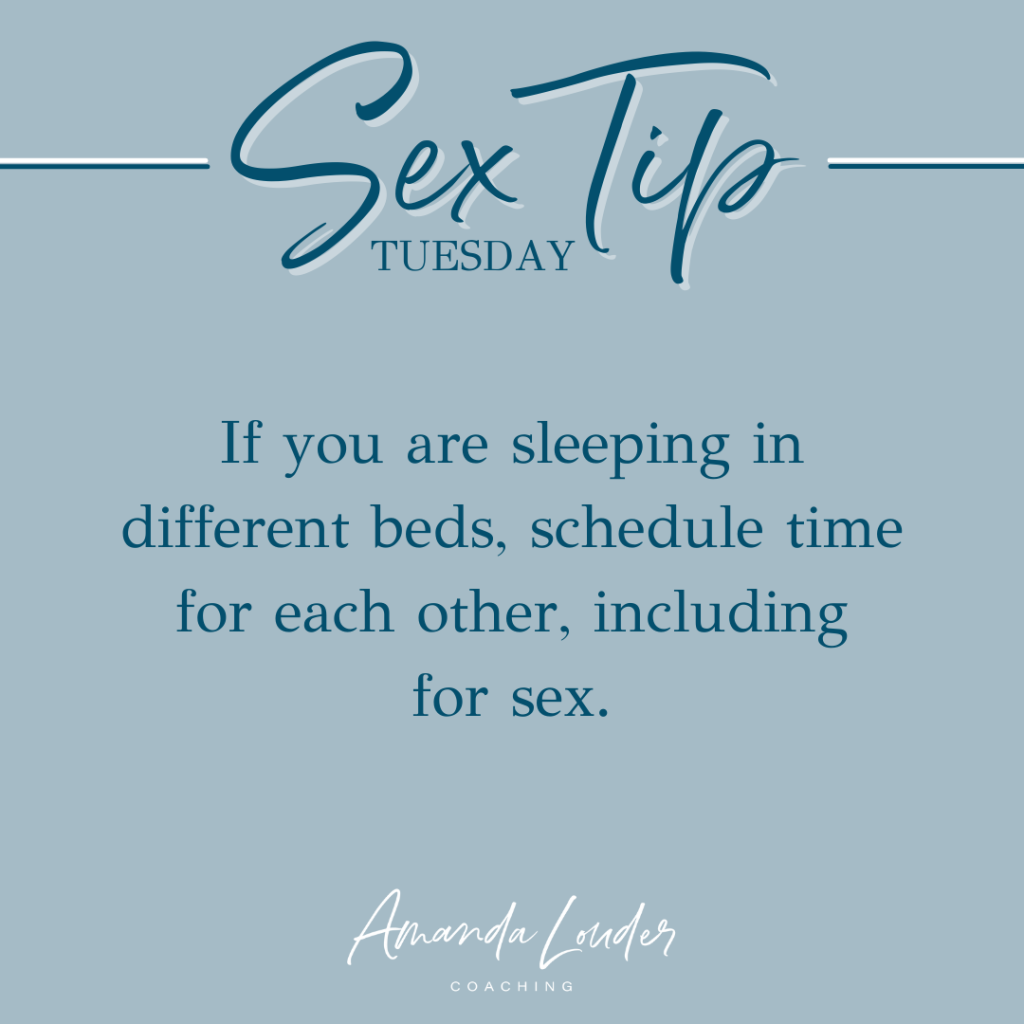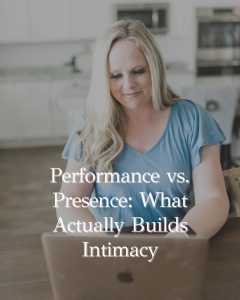
Have you heard about sleep divorce? “Sleep divorce” is a situation where couples sleep separately on a regular basis to improve their sleep quality due to issues like snoring, different sleeping schedules, or personal preferences. Studies show that it can help save relationships, but it may also cause problems. Listen to this episode to find out what those problems may be and how to make it work in your relationship.
Show Notes:
Follow Amanda on Facebook and Instagram.
Join Amanda’s Private Facebook Group.
References for this episode:
Show Summary:
Have you heard of a sleep divorce? I hadn’t until a listener brought it up to me a couple of months ago. And of course, since she brought it up, now I’m seeing it everywhere.
In March of 2020, Today Show’s Carson Daly announced that he and his wife started sleeping in separate bedrooms when she was pregnant with their fourth child. He said “I was served my sleep-divorce papers a few years ago. It’s the best thing that ever happened to us. We both, admittedly, slept better apart.” Carson jokes that he and his wife got a sleep divorce due to “irreconcilable sleeping.”
Apparently, sleep divorce is actually a thing. A survey of 3,000 Americans found about 31% of respondents would like a sleep divorce in their relationship. The National Sleep foundation had similar findings in a 2017 survey, which estimated one in four American couples sleep in separate beds and one in ten couples sleep in separate rooms. Even more telling is the increasing number of custom homes built with separate master bedrooms. According to a survey by the National Association of Home Builders, potential homebuyers looking for two full master bedroom suites grew from 25 to 40 percent in the 15 years leading up to 2018.
So what exactly is a sleep divorce? It’s an arrangement between couples to sleep apart on a regular basis to improve their sleep hygiene. Couples either sleep in separate beds, separate rooms, or adhere to a different sleep schedules. This is done to address issues related to sleep disturbances, snoring, different sleep schedules, or personal preferences for a sleeping environment, among other reasons. While this may sound extreme or perhaps not ideal for your sex life, for many it can help save a relationship.
In a Facebook group I am in, a question was asked about couples sleeping apart and a variety of reasons came up.
“My spouse can often stay up to 4-5am or even longer.”
“She likes it dark, while I prefer the natural light to wake me up.”
“I like to fall asleep to music and she doesn’t”
“She wakes up easily and I don’t”
“She’s up with the baby quite a bit, so it was easier for me to get a good night’s sleep elsewhere.”
“I’m a light sleeper and he snores”
“He moves around a lot at night and it wakes me up”
“He likes the room to be a refrigerator and I sleep with twelve blankets so I don’t freeze.”
“He has chronic pain and tends to readjust and get up a lot.”
“He’s like a furnace and I get too hot now that I’m in perimenopause.”
“Ever since she hit menopause, she gets so hot that she wants the room freezing cold.”
“He gets up so early for work and thinks that lights are no big deal to sleep through.”
For many of these couples, the growing issues in their marriage from the lack of sleep were causing serious problems. One even described it as a “potential war zone.” Tiredness, irritability, and resentment definitely don’t help you have a better relationship and a more satisfying sex life.
In Episode 198 – Sex & Sleep, I discuss the importance of sleep when it comes to our overall well-being as well as our sexual relationship. So, this “sleep divorce” concept may be on to something because it helps couples improve sleep quality and address individual sleep preferences, although I really don’t like the term “sleep divorce.”
And while it can have positive outcomes, a sleep divorce can also potentially cause problems in a relationship. Here are some possible issues to consider:
- Lack of physical intimacy: If a couple is used to sleeping together in the same bed, sleeping separately can lead to a decrease in physical intimacy, cuddling, and other forms of physical affection that often happen during the night. If this is already an issue in your marriage, a sleep divorce can make it ever worse.
- Emotional distance: Sharing a bed with a partner can create a sense of closeness and intimacy, and sleeping separately can lead to emotional distance between partners.
- Perception of the relationship: For some couples, sleeping separately may be perceived as a sign of distance or problems in the relationship, which could create a feeling of insecurity or stress.
- Limited space: Not all homes may have the space or resources to accommodate separate sleeping arrangements, which can lead to practical challenges.
So, how can you make a sleep divorce work for you and your marriage?
- Discuss the new arrangements before taking the step towards sleeping apart. Start with letting your partner know that you love and appreciate them, and then bring up that you haven’t been sleeping well.
- Stay away from blame. Instead of using words like “you” as in “you keep me up all night” instead, use the word “I” or “we.” “We have different sleep styles and so I haven’t been getting the restful night sleep that I need.”
- Suggest a change: “I’m wondering if you’re open trying things that may work for both of us. I only bring this up because I deeply care about you and our relationship and I think if we are intentional with how we handle things, the quality of our sleep can go up without impacting our relationship or sex life.”
- Schedule time together before heading to separate beds. Make sure that you are taking opportunities to touch and connect to each other throughout the day. Hug in the kitchen or snuggle while watching TV. Schedule sex in your calendar, if that feels like it will work for the two of you, so that you can both make it a priority on those days.
- Express your appreciation. “I’m so grateful that we can work these things out together.” Or “I really appreciate that you’re hearing how hard it is for me to sleep and willing to work with me on it.”
In general, a sleep divorce can be a good thing when it helps both partners get the rest they need and improves overall relationship satisfaction. If you are using it to get away from discomfort you feel around sex and intimacy, then it’s probably only going to make things worse, not better. It’s really important to communicate openly and honestly with your partner about your sleep needs and preferences to find a solution that works for both of you, whether that includes changes so that you can stay sleeping in the same bed or room, or apart.





